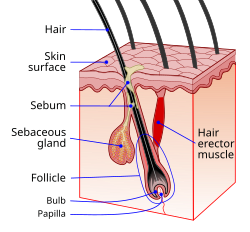Hair disease

Editor-In-Chief: Prab R Tumpati, MD
Obesity, Sleep & Internal medicine
Founder, WikiMD Wellnesspedia &
W8MD's medical weight loss NYC, sleep center NYC
Philadelphia medical weight loss and Philadelphia sleep clinics
| Hair disease | |
|---|---|

| |
| Synonyms | N/A |
| Pronounce | N/A |
| Specialty | N/A |
| Symptoms | Hair loss, itching, scaling, inflammation |
| Complications | Scarring, infection |
| Onset | Varies by condition |
| Duration | Varies by condition |
| Types | N/A |
| Causes | Genetics, hormonal changes, autoimmune disorders, infections, nutritional deficiencies |
| Risks | Family history, stress, poor nutrition |
| Diagnosis | Physical examination, biopsy, blood tests |
| Differential diagnosis | Alopecia areata, tinea capitis, seborrheic dermatitis, psoriasis |
| Prevention | Depends on specific condition |
| Treatment | Topical treatments, oral medications, light therapy, surgery |
| Medication | N/A |
| Prognosis | Varies by condition |
| Frequency | Common |
| Deaths | N/A |
Hair disease refers to a broad category of conditions that affect the hair follicle, hair shaft, or the area surrounding the hair. These conditions can lead to hair loss, changes in hair texture, or other cosmetic and health issues.
Types of Hair Diseases[edit]
There are several types of hair diseases, including:
- Alopecia: This is a general term for hair loss. Alopecia can occur in many different forms, including androgenetic alopecia (common baldness), alopecia areata (patchy hair loss), and telogen effluvium (temporary hair shedding).
- Tinea capitis: Also known as ringworm of the scalp, this is a fungal infection that causes hair loss and scaling.
- Trichotillomania: This is a psychological condition in which a person pulls out their own hair.
- Hirsutism: This condition is characterized by excessive hair growth in areas where hair is usually minimal or absent, such as the face and chest in women.
- Hypertrichosis: This condition is characterized by excessive hair growth over and above the normal for the age, sex and race of an individual, in contrast to hirsutism, which is excess hair growth in women.
Causes[edit]
Hair diseases can be caused by a variety of factors, including genetic predisposition, hormonal changes, certain medications, stress, and underlying health conditions such as autoimmune diseases and thyroid disorders.
Treatment[edit]
Treatment for hair diseases depends on the specific type of hair disease and its underlying cause. Options may include medication, surgery, laser therapy, and behavioral therapy.
See Also[edit]
Ad. Transform your life with W8MD's Budget GLP-1 injections from $75


W8MD offers a medical weight loss program to lose weight in Philadelphia. Our physician-supervised medical weight loss provides:
- Weight loss injections in NYC (generic and brand names):
- Zepbound / Mounjaro, Wegovy / Ozempic, Saxenda
- Most insurances accepted or discounted self-pay rates. We will obtain insurance prior authorizations if needed.
- Generic GLP1 weight loss injections from $75 for the starting dose.
- Also offer prescription weight loss medications including Phentermine, Qsymia, Diethylpropion, Contrave etc.
NYC weight loss doctor appointmentsNYC weight loss doctor appointments
Start your NYC weight loss journey today at our NYC medical weight loss and Philadelphia medical weight loss clinics.
- Call 718-946-5500 to lose weight in NYC or for medical weight loss in Philadelphia 215-676-2334.
- Tags:NYC medical weight loss, Philadelphia lose weight Zepbound NYC, Budget GLP1 weight loss injections, Wegovy Philadelphia, Wegovy NYC, Philadelphia medical weight loss, Brookly weight loss and Wegovy NYC
|
WikiMD's Wellness Encyclopedia |
| Let Food Be Thy Medicine Medicine Thy Food - Hippocrates |
Medical Disclaimer: WikiMD is not a substitute for professional medical advice. The information on WikiMD is provided as an information resource only, may be incorrect, outdated or misleading, and is not to be used or relied on for any diagnostic or treatment purposes. Please consult your health care provider before making any healthcare decisions or for guidance about a specific medical condition. WikiMD expressly disclaims responsibility, and shall have no liability, for any damages, loss, injury, or liability whatsoever suffered as a result of your reliance on the information contained in this site. By visiting this site you agree to the foregoing terms and conditions, which may from time to time be changed or supplemented by WikiMD. If you do not agree to the foregoing terms and conditions, you should not enter or use this site. See full disclaimer.
Credits:Most images are courtesy of Wikimedia commons, and templates, categories Wikipedia, licensed under CC BY SA or similar.
Translate this page: - East Asian
中文,
日本,
한국어,
South Asian
हिन्दी,
தமிழ்,
తెలుగు,
Urdu,
ಕನ್ನಡ,
Southeast Asian
Indonesian,
Vietnamese,
Thai,
မြန်မာဘာသာ,
বাংলা
European
español,
Deutsch,
français,
Greek,
português do Brasil,
polski,
română,
русский,
Nederlands,
norsk,
svenska,
suomi,
Italian
Middle Eastern & African
عربى,
Turkish,
Persian,
Hebrew,
Afrikaans,
isiZulu,
Kiswahili,
Other
Bulgarian,
Hungarian,
Czech,
Swedish,
മലയാളം,
मराठी,
ਪੰਜਾਬੀ,
ગુજરાતી,
Portuguese,
Ukrainian


